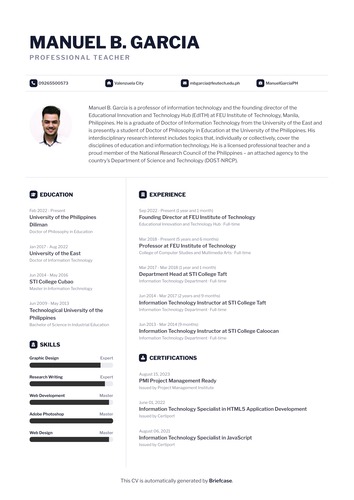Are you ready to introduce yourself?
Show the world what you're made of 💪
Effortlessly showcase your accomplishments because being awesome 😎 deserves a spotlight.
Create
Effortlessly build an online portfolio to showcase your accomplishments.
Share
Share your online portfolio and broadcast your successes to the world.
Connect
Expand your professional circle and forge meaningful relationships.
Building Your Career, One CV at a Time
Create Your Professional CV
Say goodbye to the hassle of manual formatting and updates, and start elevating your professional journey with Briefcase's automatic CV generator.
Seamlessly convert your achievements, skills, and experiences into a polished document suitable for job applications, interviews, and networking.


Streamlined Process
Save time and effort by automatically converting your online portfolio content into a well-structured CV.
Professional Formatting
Your CV will maintain a professional look and feel, ensuring you make a strong impression on potential employers.
Versatile Usage
Use your CV for job applications, networking, or any situation where you need to showcase your qualifications.
Always Up-to-Date
Your CV stays current with your latest achievements as you update your portfolio, eliminating the need for manual updates.
Spotlight on Briefcase Users
Here are a few of the incredible tamaraws who have embraced our platform to showcase their skills and accomplishments.
Patricia Mae A. Adriano
BS - Computer Engineering
Jon Carlos C. Tapang
Hello I am Tapang Jon Carlos currently student at FEU Tech
Ralph Evan G. Selga
Civil Engineering Student | Structural Engineering
Jomnuel Joseph D. MaraÑa
“The past is the past. We cannot indulge ourselves in memories and destroy the present” — Murata Ken
Patrick Raizen T. Basco
A humble and aspiring BSCPE student
Denisse Elaiza O. Conde
BSCE student at FEU Alabang
Mark Angelo R. Quijano
Civil Engineering Student
Franiel Allen R. Sarto
Aspiring IT Professional | Service Management and Business Analytics Student
Frequently Asked Questions
Ready to show the world?
Join the movement of tamaraws who showcase their accomplishments and show the world what they're made of.
Get started — it’s freeJoin 18728 tamaraws today and start showcasing.

